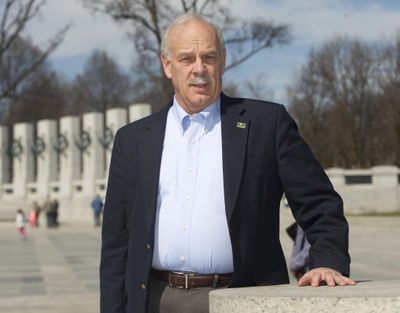Yellowstone park boss says retirement isn’t tied to politics

BILLINGS – Yellowstone National Park’s superintendent said Friday that he plans to retire next year from a job he called “the best in the National Park Service” and dismissed speculation that the Trump administration pushed him out for political reasons.
Superintendent Dan Wenk told the Associated Press he decided last fall he would retire in early 2019 after more than four decades with the National Park Service.
His seven-year tenure leading on the nation’s premier national parks was marked by an explosion in park visitation, tension with neighboring states over wild bison slaughters and wolf hunting, and a sexual harassment scandal involving Yellowstone’s maintenance division that echoed allegations at other national parks.
Wenk, 66, said he had not planned to announce his decision to leave so far in advance but went public following recent news reports that said he faced a possible transfer to a job in Washington, D.C.
Wenk confirmed that a transfer had been proposed – a possibility that had stoked concerns among conservation groups that Interior Department Secretary Ryan Zinke was reassigning senior staff from the park service and other branches of the agency for punitive purposes.
But Wenk said he always understood that as a member of the U.S. government’s senior executive service, he could be moved to another job, adding, “I’m not aware of any politics in that decision.”
“Coming to Yellowstone National Park was the pinnacle of my career,” Wenk said. “I personally believe it’s the best job in the National Park Service, so taking any other job wouldn’t feel good.”
In a letter to his superiors informing them of his March 30 retirement plan, Wenk said he intended to stay on a while longer to see through several projects that have been in the works for years. Those include relocating park bison that have not been exposed to disease to Montana’s Fort Peck Indian Reservation, working on a long-term visitor use management plan and negotiating several concessions contracts.
Yellowstone straddles the borders of Montana, Wyoming and Idaho and was established in the 1872 as the first national park. It attracts tourists from around the world, putting an increasing strain on its natural resources as more than 4 million people visited in each of the past three years.
The superintendent oversees more than 3,400 square miles of land, a staff of 800 and an annual budget of more than $60 million.
Montana Gov. Steve Bullock said in a statement that Wenk had been “a thoughtful partner to the state of Montana and the gateway communities surrounding Yellowstone National Park.”
Wenk began his career with the park service as a landscape architect in 1975. He was superintendent of Mount Rushmore National Monument for 16 years, beginning in 1985.
In 2001, he was appointed director of the Denver Service Center, which is the park service’s central office with responsibility for planning, design and construction.
Wenk served as deputy director of operations for the National Park Service from 2007 through 2011, and acting director of the agency for nine months in 2009.